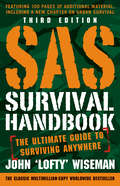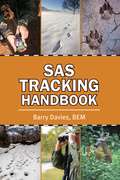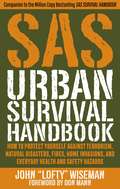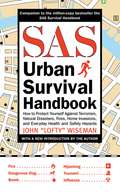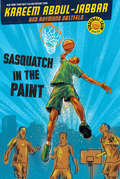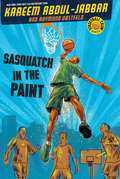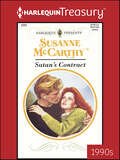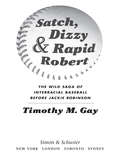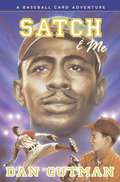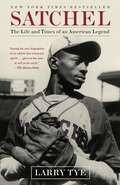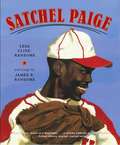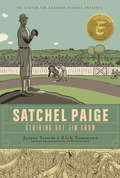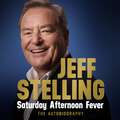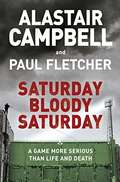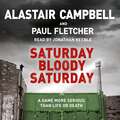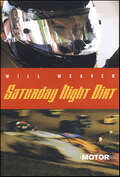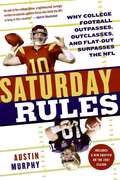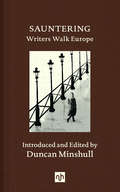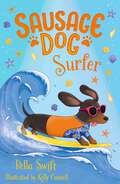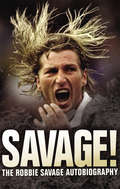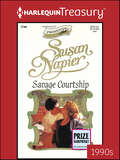- Table View
- List View
SAS Survival Handbook, Third Edition
by John 'Lofty' WisemanThe ultimate guide to surviving anywhereUpdated to reflect the latest in survival knowledge and technology, and covering new topics such as urban survival and terrorism, the internationally bestselling SAS Survival Handbook is the definitive resource for all campers, hikers, and outdoor adventurers. From basic campcraft and navigation to fear management and strategies for coping with any type of disaster, this complete course includes:Being prepared: Understanding basic survival skills, like reading the weather, and preparation essentials, such as a pocket survival kit.Making camp: Finding the best location, constructing the appropriate shelter, organizing camp, staying warm, and creating tools.Food: What to eat, what to avoid, where to find it, and how to prepare it.First aid: A comprehensive course in emergency/wilderness medicine, including how to maximize survival in any climate or when injured.Disaster survival: How to react in the face of natural disasters and hostile situations--and how to survive if all services and supplies are cut off.Self-defense: Arming yourself with basic hand-to-hand combat techniques.Security: Protecting your family and property from intrusion, break-ins, and theft.Climate & terrain: Overcoming any location, from the tropics to the poles, from the desert to the mountains and sea.
SAS Tracking Handbook
by Barry DaviesTracking originated with man's need for food; he needed to understand what he was following and what the rewards would be if he was successful. Little has changed over time about the terms of tracking. We still track game for sport and food, but we have also found other uses for tracking. Border police patrol to stop illegal immigrants from entering their country; the military tracks down wanted terrorists or enemy forces. Tracking has become a military skill.In the SAS Tracking Handbook, former SAS soldier and British Empire Medal (BEM) award-winner Barry Davies teaches not only how to survive in the outdoors with the skills of tracking, but how to use these skills from a military standpoint.Included in this book are many helpful tips on topics including:The types of dogs used for tracking.Traps for catching wild animals.Modern military tracking.Using your surroundings to your advantage.And much more.The success or failure of the modern tracker is dependent on the personal skills of the individual tracker. Training is vital in learning tracking skills, and continuous exercise the best way to interpret signs. These skills are rarely found, but they remain hidden deep within all of us. So whether you're already a skilled tracker or a novice in the field, the SAS Tracking Handbook will be your guide to mastering this old and respected art.
SAS Urban Survival Handbook: How to Protect Yourself Against Terrorism, Natural Disasters, Fires, Home Invasions, and Everyday Health and Safety Hazards
by Don Mann John Lofty" WisemanJohn “Lofty” Wiseman is the author of the bestselling SAS Survival Handbook, the definitive guide to survival in the wild from Britain’s Special Air Service. Now he has compiled the complete guide to surviving among crowds of people, the mazes of office buildings, the dangers of an unfeeling city—put simply, how to stay safe in the urban jungle. <p><p> Thousands of preventable fatalities occur in the home every year—more than on the roads, more than in the great outdoors. Household chemicals, electricity, cooking knives, and rodent poisons—in the wrong hands and with improper usage, these day-to-day resources bring danger to your home. Add to this the risks of moving through city streets (the threat of rape, muggings, and gang violence) and the menace of natural disasters (floods, earthquakes, blizzards) that cannot be avoided. Every day serves as a constant reminder: The world is truly a frightening place. The SAS Urban Survival Guide advises readers to think practically about urban environments and offers tips and instructions on howto avoid hazards wherever one goes. From self-defense techniques to home security systems to coping with natural disasters, this book teaches readers to recognize danger, make quick decisions, and live confidently in the modern world.
SAS Urban Survival Handbook: How to Protect Yourself Against Terrorism, Natural Disasters, Fires, Home Invasions, and Everyday Health and Safety Hazards
by John Lofty" WisemanJohn "Lofty" Wiseman is the author of the bestselling SAS Survival Handbook, the definitive guide to survival in the wild from Britain's Special Air Service. Now he has compiled a complete guide to survival in the urban jungle. Every year in America there are thousands of fatal accidents in the home—more than on the roads, and many more than in the great outdoors. Fire, electricity, water, gas, sharp knives, poisons, chemicals—these valuable tools can quickly become dangerous weapons when not treated with proper respect and understanding. Add to these the risks of travel, terrorism, muggings, rape, tsunamis, and earthquakes. We are constantly reminded that the world is a dangerous place. Wiseman shows readers how to think realistically and practically about these perils in order to avoid them, whether they are at home, on the street, in school, or in transit. From self-defense techniques to home security systems to coping with natural disasters, this book will teach readers to recognize risks, make quick decisions, and live confidently in the modern urban world.
Sasquatch in the Paint (Streetball Crew #1)
by Kareem Abdul-Jabbar Raymond ObstfeldTheo Rollins is starting eighth grade six inches taller, and his new height is making everyone expect more from him. Coach Mandrake wants to transform him from invisible science geek into star basketball player, even though Theo has little experience with the game. When Theo tries to hone his skills by playing pick-up ball in the park, kids are eager to include him at first; then they quickly see that he has no control of his gangly body. A girl named Rain even dubs him "Sasquatch." To make matters worse, all his time spent on training is starting to hurt his science club's chances of winning the "Aca-lympics," the school's trivia competition. Just when Theo thinks he can't handle any more pressure, he's accused of stealing. Can he find the real thief before he is kicked off the basketball and science club teams, or will his attempt at sleuthing be yet another air ball? Loosely based on challenges that NBA legend Kareem Abdul-Jabbar faced while growing up, Sasquatch in the Paint is a slam dunk for fans of basketball action and absorbing mysteries
Sasquatch in the Paint
by Kareem Abdul-Jabbar Raymond ObstfeldEighth-grader Theo Rollins' growth spurt has Coach Mandrake trying to transform him into a basketball star, but training time is hurting the science club's chances of winning the "Aca-lympics".
Satan's Contract
by Susanne McCarthy"Your daughter can pay the debt for you-in my bed."There was nothing Pippa could do to stop her parents from bartering with Shaun Morgan-using Pippa as the price. Shaun held all the aces: he'd inherited the family fortune, and Pippa's father was in grave financial trouble. The only solution was if Pippa became Shaun's bride. Pippa's attraction to Shaun had turned into something deeper, but she knew he despised her and for him it could only be a marriage of convenience-though one of the utmost convenience, since Pippa was Shaun's surest means of getting his revenge....
Satch, Dizzy, and Rapid Robert
by Timothy M. GayBefore Jackie Robinson integrated major league baseball in 1947, black and white ballplayers had been playing against one another for decades--even, on rare occasions, playing with each other. Interracial contests took place during the off-season, when major leaguers and Negro Leaguers alike fattened their wallets by playing exhibitions in cities and towns across America. These barnstorming tours reached new heights, however, when Satchel Paige and other African- American stars took on white teams headlined by the irrepressible Dizzy Dean. Lippy and funny, a born showman, the native Arkansan saw no reason why he shouldn't pitch against Negro Leaguers. Paige, who feared no one and chased a buck harder than any player alive, instantly recognized the box-office appeal of competing against Dizzy Dean's "All-Stars." Paige and Dean both featured soaring leg kicks and loved to mimic each other's style to amuse fans. Skin color aside, the dirt-poor Southern pitchers had much in common. Historian Timothy M. Gay has unearthed long-forgotten exhibitions where Paige and Dean dueled, and he tells the story of their pioneering escapades in this engaging book. Long before they ever heard of Robinson or Larry Doby, baseball fans from Brooklyn to Enid, Oklahoma, watched black and white players battle on the same diamond. With such Hall of Fame teammates as Josh Gibson, Turkey Stearnes, Mule Suttles, Oscar Charleston, Cool Papa Bell, and Bullet Joe Rogan, Paige often had the upper hand against Diz. After arm troubles sidelined Dean, a new pitching phenom, Bob Feller--Rapid Robert--assembled his own teams to face Paige and other blackballers. By the time Paige became Feller's teammate on the Cleveland Indians in 1948, a rookie at age forty-two, Satch and Feller had barnstormed against each other for more than a decade. These often obscure contests helped hasten the end of Jim Crow baseball, paving the way for the game's integration. Satchel Paige, Dizzy Dean, and Bob Feller never set out to make social history--but that's precisely what happened. Tim Gay has brought this era to vivid and colorful life in a book that every baseball fan will embrace.
Satch & Me
by Dan Gutman"You wanna know who threw the fastest pitch ever?" Many baseball players claim that Satchel Paige was the fastest pitcher in the history of the game. Stosh and his coach, Flip Valentini, are on a mission to find out. With radar gun in tow, they travel back to 1942 and watch Satch pitch to power hitter Josh Gibson in the Negro League World Series. They soon learn that everything about Satch is fast--whether it's his talking, driving, or getaways. But is he really the fastest pitcher who ever lived? This baseball card adventure is a whirlwind of excitement, drama, and curveballs--starring one of the liveliest athletes in the game!
Satchel: The Life and Times of an American Legend
by Larry TyeHe is that rare American icon who has never been captured in a biography worthy of him. Now, at last, here is the superbly researched, spellbindingly told story of athlete, showman, philosopher, and boundary breaker Leroy "Satchel" Paige.Through dogged research and extensive interviews, award-winning author and journalist Larry Tye has tracked down the truth about this majestic and enigmatic pitcher. Here is the stirring account of the child born to a poor Alabama washerwoman, the boy who earned his nickname from his enterprising work as a railroad porter, and the young man who took up baseball on the streets and in reform school before becoming the superstar hurler of the Negro Leagues.In unprecedented detail, Tye reveals how Paige, hurt and angry when Jackie Robinson beat him in breaking the Majors' color barrier, emerged at the improbable age of forty-two to help propel the Cleveland Indians to the World Series. ("Age is a case of mind over matter," he said. "If you don't mind, it don't matter.")Rewriting our history of baseball's integration with Paige in the starring role and separating truth from legend, Satchel is a story as large as this larger-than-life man.
Satchel Paige
by Lesa Cline-RansomePlay ball with Satchel Paige with this nonfiction picture book biography from two Coretta Scott King Award–winning creators. No one pitched like Leroy “Satchel” Paige. Fans packed the stands to see how many batters he could strike out in one game. He dazzled them with his unique pitching style, and he even gave nicknames to some of his trademark pitches—there was the “hesitation,” his magic slow ball, and the “bee ball,” named because it would always “be” where he wanted it to be. Follow Satch’s career through these beautiful illustrations as he begins playing in the semi-pros and goes on to become the first African American to pitch in a major League World Series, and the first Negro Leaguer to be inducted into the Baseball Hall of Fame.
Satchel Paige: Striking Out Jim Crow (The Center for Cartoon Studies Presents)
by James SturmBaseball Hall of Famer Leroy "Satchel" Paige (1906 - 1982) changed the face of the game in a career that spanned five decades. Much has been written about this larger-than-life pitcher, but when it comes to Paige, fact does not easily separate from fiction. He made a point of writing his own history . . . and then re-writing it. A tall, lanky fireballer, he was arguably the Negro League's hardest thrower, most entertaining storyteller and greatest gate attraction. Now the Center for Cartoon Studies turns a graphic novelist's eye to Paige's story. Told from the point of view of a sharecropper, this compelling narrative follows Paige from game to game as he travels throughout the segregated South. In stark prose and powerful graphics, author and artist share the story of a sports hero, role model, consummate showman, and era-defining American.
Saturday Afternoon Fever: The Autobiography
by Jeff Stelling'Made me laugh and cry' Chris Kamara'Such an enjoyable book' Ally McCoist'Jeff's autobiography is a riot of humour and nostalgia. A great read' Phil Thompson'Saturday Afternoon Fever is great fun - right out of the top drawer' Paul MersonA profoundly personal, warmly nostalgic and deliciously funny memoir by the legendary Sky Sports anchorman Jeff Stelling, chronicling a life spent obsessing about 'The Beautiful Game' ever since he was a little boy, and underpinned by a deeply rooted love of football and of people.For a quarter of a century the iconic Sky Sports football presenter Jeff Stelling was the face and voice of football television. As the host of Soccer Saturday, a results show with National Treasure status, he expertly presided over a live panel of former footballers watching the most exciting sporting chapter of the weekend, on the telly, in front of a transfixed audience of millions, watching, unbelievably... on the telly.Beginning at midday and wrapping just after the Premier League's players had showered and changed, the show's popularity stitched Stelling into the fabric of match-day rituals up and down the country. For fans, the weekend didn't exist without an hour or four of Soccer Saturday.Saturday Afternoon Fever is Stelling's moving and fascinating memoir: a love letter to the game that has shaped and defined him, as it has millions of other football fans across the UK. This is the passionate, engaging tale of one fan's journey from the terraces at Hartlepool's rainy Victoria Park in the 1960s to the sleek and salubrious confines of the Sky Sports studios, an adventure that spans well over half a century and some of the most fast-changing, exciting periods in football's history.
Saturday Afternoon Fever: The Autobiography
by Jeff Stelling'Made me laugh and cry' Chris Kamara'Such an enjoyable book' Ally McCoist'Jeff's autobiography is a riot of humour and nostalgia. A great read' Phil Thompson'Saturday Afternoon Fever is great fun - right out of the top drawer' Paul MersonA profoundly personal, warmly nostalgic and deliciously funny memoir by the legendary Sky Sports anchorman Jeff Stelling, chronicling a life spent obsessing about 'The Beautiful Game' ever since he was a little boy, and underpinned by a deeply rooted love of football and of people.For a quarter of a century the iconic Sky Sports football presenter Jeff Stelling was the face and voice of football television. As the host of Soccer Saturday, a results show with National Treasure status, he expertly presided over a live panel of former footballers watching the most exciting sporting chapter of the weekend, on the telly, in front of a transfixed audience of millions, watching, unbelievably... on the telly.Beginning at midday and wrapping just after the Premier League's players had showered and changed, the show's popularity stitched Stelling into the fabric of match-day rituals up and down the country. For fans, the weekend didn't exist without an hour or four of Soccer Saturday.Saturday Afternoon Fever is Stelling's moving and fascinating memoir: a love letter to the game that has shaped and defined him, as it has millions of other football fans across the UK. This is the passionate, engaging tale of one fan's journey from the terraces at Hartlepool's rainy Victoria Park in the 1960s to the sleek and salubrious confines of the Sky Sports studios, an adventure that spans well over half a century and some of the most fast-changing, exciting periods in football's history.
Saturday Afternoon Fever: The Autobiography
by Jeff Stelling'Made me laugh and cry' Chris Kamara'Such an enjoyable book' Ally McCoist'Jeff's autobiography is a riot of humour and nostalgia. A great read' Phil Thompson'Saturday Afternoon Fever is great fun - right out of the top drawer' Paul MersonA profoundly personal, warmly nostalgic and deliciously funny memoir by the legendary Sky Sports anchorman Jeff Stelling, chronicling a life spent obsessing about 'The Beautiful Game' ever since he was a little boy, and underpinned by a deeply rooted love of football and of people.For a quarter of a century the iconic Sky Sports football presenter Jeff Stelling was the face and voice of football television. As the host of Soccer Saturday, a results show with National Treasure status, he expertly presided over a live panel of former footballers watching the most exciting sporting chapter of the weekend, on the telly, in front of a transfixed audience of millions, watching, unbelievably... on the telly.Beginning at midday and wrapping just after the Premier League's players had showered and changed, the show's popularity stitched Stelling into the fabric of match-day rituals up and down the country. For fans, the weekend didn't exist without an hour or four of Soccer Saturday.Saturday Afternoon Fever is Stelling's moving and fascinating memoir: a love letter to the game that has shaped and defined him, as it has millions of other football fans across the UK. This is the passionate, engaging tale of one fan's journey from the terraces at Hartlepool's rainy Victoria Park in the 1960s to the sleek and salubrious confines of the Sky Sports studios, an adventure that spans well over half a century and some of the most fast-changing, exciting periods in football's history.
Saturday Bloody Saturday
by Alastair Campbell Paul FletcherFootball manager Charlie Gordon is struggling with one defeat after another at the club he loves. Only a decent Cup run is keeping him in work, but tensions are running close to the surface ahead of the next round: Chelsea away. Footballers fall into two categories: artists or assassins. Soon Charlie is going to find out which players can deliver - and just how much pressure they can all stand.Meanwhile, as the country prepares for a general election, one of the most dangerous political assassinations in the IRA's history is being planned in London. An active service unit await the critical signal to proceed...Both sides will converge on the capital for a result that will shake everyone's lives, with consequences far beyond football.
Saturday Bloody Saturday
by Alastair Campbell Paul FletcherFebruary 1974. Football manager Charlie Gordon is struggling, and with each defeat the sack gets closer. His greatness as a player counts for nothing with directors or fans, or the Number 2 who is after his job. Things are no better off the field, and after a failed marriage and the loss of a child, he is taking more and more consolation in alcohol.Only a decent Cup run is keeping him in work. But how to turn things around with the same players who got him here in the first place? Can he trust this remarkable but often unreliable mix of characters to save him? Footballers fall into two categories - artists or assassins. With the next round of the Cup at Chelsea away he will soon find out which of his players, from homesick teenage starlet Willie Buchanan, to playboy record signing DD Marland, can deliver for him.Meanwhile, as the country prepares for a general election, one of the most audacious and high-profile political assassinations in the IRA's history is being planned in London. An active service unit of two men and a woman await the critical signal to proceed. Now both teams - the IRA's and Charlie's - converge on the capital for a result that will alter everyone's lives irrevocably, with consequences far beyond football.Read by Jonathan Keeble(p) Orion Publishing Group 2018
Saturday Night Dirt
by Will WeaverIt's a sizzling summer Saturday, and Headwaters Speedway has suddenly become the place to be. Thanks to rain outs across the state, this small-town dirt track is drawing both big-time stock cars and local drivers. There's Trace Bonham, whose Street Stock Chevy is acting up in a big way. And Beau Kim, whose "stone soup" Modified has been patched together from whatever parts he could scrape up. And no one could forget Amber Jenkins, a strawberry blonde who has what it takes to run rings around them all. Keeping everyone on track is Melody Walters, who knows that the impending rain might be exactly what they need to keep her father's speedway afloat--or sink it for good. In Will Weaver's high-revving novel, the first in the Motor series, a cast of car-obsessed teens and adults are all out to prove themselves, both on and off the quarter-mile track, as they move through their day on a collision course to meet on Saturday night dirt.
Saturday Night Dirt (Motor Novels)
by Will WeaverIt's a sizzling summer Saturday, and Headwaters Speedway has suddenly become the place to be. Thanks to rainouts across the state, this small-town dirt track is drawing both big-time stock cars and local drivers. There's Trace Bonham, whose Street Stock Chevy is acting up in a big way. And Beau Kim, whose "stone soup" Modified has been patched together from whatever parts he could scrape up. And no one could forget Amber Jenkins, a strawberry blonde who has what it takes to run rings around them all. Keeping everyone on track is Melody Walters, who knows that the impending rain might be exactly what they need to keep her father's speedway afloat—or sink it for good.In Will Weaver's high-revving novel, the first in the Motor series, a cast of car-obsessed teens and adults are all out to prove themselves, both on and off the quarter-mile track, as they move through their day on a collision course to meet on Saturday night dirt.Saturday Night Dirt is a 2009 Bank Street - Best Children's Book of the Year.
Saturday Rules
by Austin MurphyAustin Murphy knows a thing or two about football. His twenty-three years at Sports Illustrated include six covering the NFL and a decade chronicling the college game. In Saturday Rules, Murphy leaves no doubt as to which beat he preferred. Does the NFL have better athletes? Yes. Does it entail more direct flights? Undoubtedly. Which game is better, more entertaining, less predictable? It's not even close-college football wins by two touchdowns. With rich traditions and deep passions-marching bands and menageries of living, breathing animal mascots; arm-long lists of ancient blood grudges-college football is far more captivating, fan-friendly, and, frankly, more fun than the corporate, clinical, risk-averse, imitation-intensive, hermetically sealed game they play on Sunday. No two programs are more storied than Notre Dame and USC, headed by those ex-NFL rivals and philosophical (and physiological) opposites Charlie Weis and Pete Carroll, perhaps the biggest names in the college game. With the inside scoop on these top-ranked teams, Murphy closely follows their arcs through the 2006 season, up to their late-November showdown in the L.A. Coliseum. He puts you in the field, in the meeting room, and in the huddle as both teams fight to keep alive their national title ambitions. Between trips to South Bend and Los Angeles, Murphy ranges repeatedly into Big Ten country, hooking up with Michigan and Ohio State, whose November 17 collision in Columbus constitutes one of the book's most memorable chapters. He ventures into the proud SEC, bearing witness to Florida's single loss of the season (and the ensuing "rolling" of Toomer's Corner). He is in the Rose Bowl for the season's most stunning upset (UCLA 13, USC, 9), and is in that grand old bowl a month later, as the Trojans are born anew. Murphy is on the field after the national title game, asking the Gators how they pulled off the upset. ("This is a fast . . . ass . . . team!" replies linebacker Brian Crum.) And he makes it his business to drop in on the Boise State Broncos after their miraculous, trick-play-intensive upset of Oklahoma in the Fiesta Bowl. Whether hanging out with members of the Ohio State marching band (including the senior sousaphonist, who will "dot the i" in the Buckeyes' famed cursive Ohio), or sampling the frighteningly potent "Gator-Killer punch" at TGFKATWLOCP (The Game Formerly Known as the World's Largest Outdoor Cocktail Party), or staying up past his bedtime to witness Notre Dame's midnight drum circle, Murphy is the perfect guide for this rich and raucous celebration of the pageantry and tradition, the talismans and rituals, that prove beyond the shadow of a doubt that when it comes to football, Saturday rules.
Sauna: The Power of Deep Heat
by Emma O'Kelly'This beautiful and timely book will appeal to anyone looking to deepen their experience, with or without the added joy of a cold swim.' Kate Rew, author of The Outdoor Swimmers' Handbook'An essential guide to a movement reborn, blending modernity and tradition, design and wellness, community and nature.' Sarah Douglas, editor in chief, Wallpaper magazineThere is a new wave of sauna culture spreading throughout the UK and beyond. Saunas are being built in unique settings providing tech-free spaces in which to gather, share stories and enjoy nature. The tradition has a rich history, filled with rituals that encourage us to soak up the mental and physical health benefits of deep heat.This book honours the old, embraces the new, and plunges headlong into the transformative power of steam.'Smartly written and beautifully illustrated ... a celebration of a cultural resurgence and a reminder of the power of connecting with nature and something larger than ourselves.' Mikkel Aaland, author of Sweat
Sauntering: Writers Walk Europe
by Duncan MinshullThis latest collection of walking literature from Notting Hill Editions celebrates the allure of the Continent.On foot the world comes our way. We get close to the Continent&’s alpine ranges, arterial rivers, expansive coastlines. Close to its ancient cities and mysterious thoroughfares; and close to the walkers themselves—the Grand Tourers and explorers, strollers and saunterers, on their hikes and quests, parades and urban drifts.Sauntering features sixty walker-writers—classic and current—who roam Europe by foot. Twenty-two countries are traversed. We join Henriette d&’Angeville, the second woman to climb Mont Blanc; Nellie Bly roaming the trenches of the First World War; Werner Herzog on a personal pilgrimage through Germany; Hans Christian Andersen in quarantine; Joseph Conrad in Cracow; Rebecca Solnit reimagining change on the streets of Prague; and Robert Macfarlane dropping deep into underground Paris.Contributors include: Patrick Leigh Fermor; John Hillaby; Robert Walser; Henriette d&’Angeville; Joseph Roth; Joanna Kavenna; Richard Wright; Werner Herzog; Robert Antelme; George Sand; Rainer Maria Rilke; Robert Macfarlane; Rebecca Solnit; Kate Humble; Nicholas Luard; Edith Wharton; Elizabeth von Armin; Joseph Conrad; D. H. Lawrence; Vernon Lee; Guy Debord, Mark Twain, Thomas Coryat, and more.
Sausage Dog Surfer: Book 2 (Sausage Dog Series)
by Bella SwiftStanley the sausage dog puppy is off to the seaside for the first time! But Stanley feels left out by the cool dogs at the beach because he doesn't even know how to doggy-paddle. Can Stanley become one of the gang, or will his attempts to make friends be a total wipeout?A heartwarming summer holiday story about how you should always be yourself.With adorable black and white illustrations throughout, Sausage Dog Surfer is a fun summer time story from the author of THE PUG WHO WANTED TO BE A UNICORN.
Savage!: The Robbie Savage Autobiography
by Janine Self Robbie SavageRobbie Savage could have been just another Manchester United reject. Instead, he used the Old Trafford scrapheap as a springboard to become one of the most instantly recognisable footballers in the Premier League, despite being told by Sir Alex Ferguson he was not good enough to stay in the class of '92 alongside David Beckham, Paul Scholes, Ryan Giggs, Nicky Butt and Gary Neville.For the last 16 years, Savage has carved out a reputation as a hard man and wind-up merchant with an unerring ability to grab a headline. From deliberately getting Tottenham's Justin Edinburgh sent off in a Wembley Cup final to the 'Jobbiegate' row with referee Graham Poll and the bust-ups with John Toshack, Rio Ferdinand, Graeme Souness and Paul Jewell, the list is endless.Yet numerous footballing legends will testify to the skill of the midfielder, who has starred for Crewe, Leicester, Birmingham, Blackburn and Derby and won 39 international caps for Wales. Behind the long blond hair, the Armani tattoo and the flamboyant cars, Savage has always been the heartbeat of his team.Savage! provides a unique insight into the extraordinary life of an elite sportsman, a colourful character and loving family man. Love him or loathe him, Robbie Savage's story is a remarkable one.
Savage Courtship
by Susan NapierWho's Been Sleeping In His Bed?"I can't deny that it's a common male fantasy to be seduced by a beautiful stranger who conveniently vanishes afterwards...."Vanessa could kick herself! It had been a simple misunderstanding...how dared Benedict Savage imply that she'd deliberately set out to seduce him? The very idea was outrageous, he simply wasn't her type! No matter that he was the last word in cool, suave sophistication-he was also her boss, and a formidable sexual predator into the bargain. But Vanessa had no intention of falling prey to his dark charm-had Benedict met his match at last?
